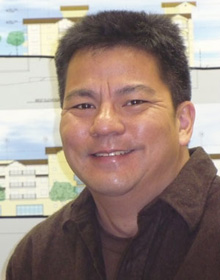 Dennis Arguelles, Los Angeles Program Manager, National Parks Conservation Association; Former Director of Programs for Search To Involve Pilipino Americans
Dennis Arguelles, Los Angeles Program Manager, National Parks Conservation Association; Former Director of Programs for Search To Involve Pilipino Americans
Dennis G. Arguelles is the Los Angeles Program Manager for the National Parks Conservation Association. He served as the Director of Programs for Search To Involve Pilipino Americans, a social service agency serving the Historic Filipinotown community of Los Angeles and Filipino Americans throughout Los Angeles County. He is the former President and Executive Director of the Asian Pacific Policy and Planning Council (A3PCON), a federation of more than 35 community-based organizations in the greater Los Angeles area. He previously served as the Assistant Director of the UCLA Asian American Studies Center and is the co-author/editor of numerous essays, articles and texts, including one of the first in-depth studies of poverty in Los Angeles’ Asian communities. In 2007, he was appointed to the City of Los Angeles Neighborhood Council Review Commission by Mayor Antonio Villaraigosa, and in 2011 he was appointed to the Los Angeles County Consumer Affairs Advisory Commission by Supervisor Mark Ridley Thomas. He received his B.A. in Political Science and M.A. in Urban Planning from UCLA.
What led you to the preservation field?
My entre into preservation work was not, at least initially, a conscious or deliberate endeavor. I really came to it in a roundabout way through other work I was doing in my community. As a manager in a small, neighborhood-based non-profit serving a very low income and disadvantaged population, I was first and foremost concerned with safety net issues, providing affordable housing, creating economic opportunities and improving local schools and public safety. But when the opportunity arose for my organization to become involved in historic preservation, it became clear to me that preserving our historic and cultural assets were part and parcel of the overall strategy of improving the quality of life in our community. Not only has historic preservation contributed to economic revitalization of our community, it has created a greater sense of identity and pride, and empowered residents to take action in improving their community.
Do you think preservation education matters? If so, why?
I don’t think formal education in historic preservation is an absolute requirement to work in the field, but I do think it matters. Ultimately professional and often specialized expertise is needed in the historic preservation process, whether in the areas of research and documentation or the actual declaration and restoration of specific sites. Having a background in the field definitely makes one a valuable asset to the local communities and institutions looking to do the work.
What courses do you recommend for students interested in this field?
I’m a numbers cruncher and pretty hands on person, so for me courses that covered market research, financial analysis, site planning, and other quantitative topics were especially helpful. Of course, historic preservation is about much more than just the numbers, but it’s important to have a rudimentary understanding of them no matter what role you play in bringing a project to fruition.
Do you have a favorite preservation project? What about it made it special?
My main historic preservation endeavor has been working on Los Angeles’ Historic Filipinotown (HiFi). This work is being done in the context of multiple community development, revitalization, and improvement efforts by my agency (Search To Involve Pilipino Americans, a nonprofit service organization), the City of Los Angeles, and other organizations in the neighborhood. We received official City recognition in 2002, and in 2011 we were named a Preserve America Community. Both designations have served to galvanize the community and have been a catalyst for other efforts, including an annual 5K and Festival, street improvement and gateway projects, recycling and sustainability efforts and others. This project is especially significant to me because it has helped document and preserve the important role the Filipino American community has played in the development of Los Angeles, whether it be in the agricultural industry, canneries, military, entertainment, health care, education, or other aspects of Los Angeles life.
Do you have advice for novice preservationists?
It’s important to not look a historic preservation in a vacuum. Ultimately, it takes resources to make a preservation project work, so finding the broadest base of supporters, allies, and contributors will always be important. This means finding common ground with folks with different priorities but who would also benefit from the project. In Historic Filipinotown, this has meant working with coalitions ranging from community improvement and public safety groups to researchers and academics to business owners, landlords, developers, and corporate interests and of course, other ethnic and minority communities. It means being flexible and not letting what you believe is “right” become the enemy of what is “best” for the community. Collaboration is key.
The ACHP’s mission is “preserving America’s heritage;” how is your community preserving their heritage?
Los Angeles’ Historic Filipinotown is somewhat unique in that traditional historic preservation models, such as getting structures listed on the National Register of Historic Places, are not completely adequate for preserving the community’s significance. As a portal for numerous immigrant groups, the neighborhood has been in constant transition, and thus few historic structures exist. Instead, our focus has been to name and label significant intersections, create signage and interpretive stations that discuss the area’s past, and have events and activities that recognize its heritage and legacy.
Read more Q&A stories about the preservationists in your neighborhood!